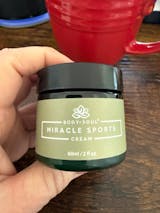Mindful Hydration: The Third Pillar to Good Health and Best Performance
We often think about diet and exercise as the pillars of good health. However, another important pillar crucial to keeping your body in optimal condition, particularly for athletic performance, is hydration.
Water makes up 60% of our bodies and is required by every cell and organ to function. It’s even more critical than food to keeping us alive. Did you know we can go weeks without food, but only three or four days without water?!
When we are active, our bodies lose water at an accelerate rate. Water evaporates through our sweat and in our breath, so the higher the intensity of the workout, the hotter the environment, the more water we will lose.

What are the effects of dehydration?
For performance athletes, hydration is not just a matter of health. Proper hydration, particularly for training and competition, requires conscious preparation and maintenance. Without it, your performance could suffer. Dehydration impacts nearly every aspect of mind/body performance.
Brain function: motor skills, reaction time, ability to focus, decision making. All be impaired by dehydration.
Body Function: nausea or gastric distress, elevation of heart rate and body temperature.
Muscle Function: muscles can tire quicker and potentially cramp.
Fatigue: the weight of fatigue creates additional mental and physical barriers to achieving performance goals.

In most cases, it’s not possible to completely replace the water that is lost during the course of strenuous activity. However, there are ways to practice mindfulness, ensuring best-case hydration levels to support rather than hurt your performance.
Hydration is a habit of self-care
Just like being conscious of eating healthy and keeping active, being mindful of when and how you hydrate goes a long way towards keeping your body humming and ready to perform. While the standard guideline is to drink at least 8 cups of water (64 ounces a day, aka two 32oz Hydro Flasks), if you habitually drink caffeinated drinks or are active, consider 8 cups the bare minimum. A good rule of thumb is to start the day drinking at least 8 ounces of water since we tend to wake up dehydrated. Make a habit to keep water close by so you can sip it throughout the day. Drink water with your meals, and ALWAYS drink when you feel thirsty. Good habits equal good health.

Practice body mindfulness
Listen to your body. Practice being mindful to the signals it sends you, the same way you notice when the check engine light comes on in your car. If you feel thirsty, you definitely need water. If you are feeling low energy or mentally foggy, try reaching for water before that energy drink. When you are well-hydrated, your pee should be a pale yellow color. If it’s darker than that, you need to up your hydration game.
Have a hydration routine for your workouts
Most people have their warmup and cooldown routines down pat. This same discipline is needed when approaching hydration. On top of a daily habit of good hydration practices, you need to properly prepare for the surge of water loss that exercise brings. The American Council on Exercise recommends drinking 17-20 ounces of water within 2-3 hours of your workout to prepare your body. Drink another 8 ounces during your warm up. You want to drink enough to lubricate your system, but not so much it’s sloshing around in your belly. Too much water can be uncomfortable and also cause nausea or gastric distress, two issues that are the last things you need when you’re pushing your body to the limit. Make sure to drink water in small amounts—often and as needed—during workouts. End your workout with at least 8 ounces to replace some of the water that was lost. And remember, if you’re someone who likes to grab a beer after the gym, alcohol is dehydrating so make sure you’re drinking water along with that beer.

Dealing with electrolyte loss
When you sweat, you don’t just lose water—you lose electrolytes as well. Electrolytes are essential minerals such as sodium, calcium, magnesium, and potassium that are key to the vital functions of the body. Specific to exercise, they regulate muscle contractions and help your body absorb water. This is why endurance athletes can suffer muscle cramps after prolonged activity. If your activity involves prolonged exertion or you have a tendency to cramp, one way to deal with this is adding an electrolyte mix to your water supply. Beware that many sports drinks have excessive sugar (carbs), sodium (salt), and caffeine which can be further dehydrating. If you do suffer a muscle cramp, rub Miracle Sports Cream on cramp right away to quickly relax the muscles before the cramp causes excessive damage to the tissue.

Good hydration is very simple to achieve but easy to overlook as it requires awareness and constant upkeep. If you spend a lot of time managing your diet and workout plan, understand that proper hydration is just as important. Practicing mindfulness towards hydration habits supports your mind, body and performance goals. Listening to your body ensures it gets what it needs to smash those goals.
Now go fill up your water bottle and get to work!


